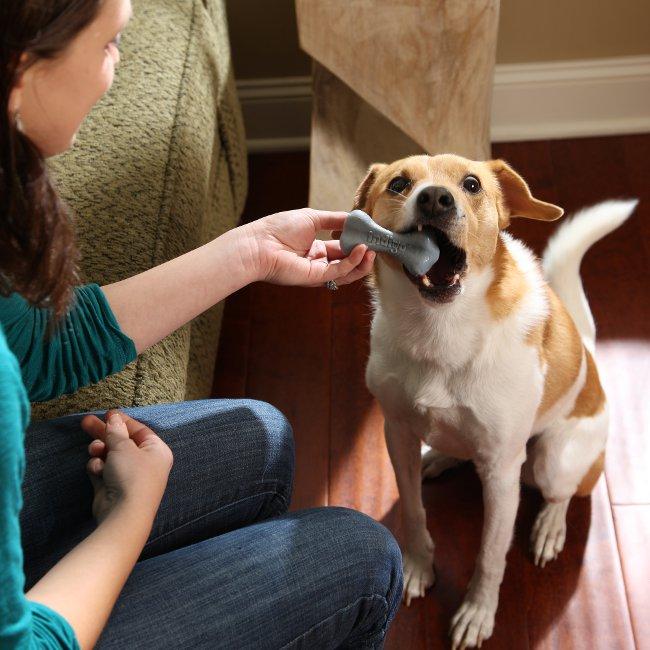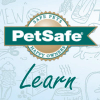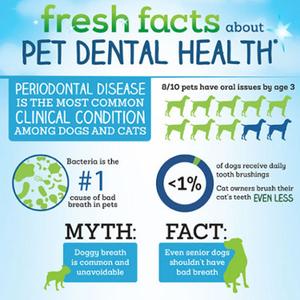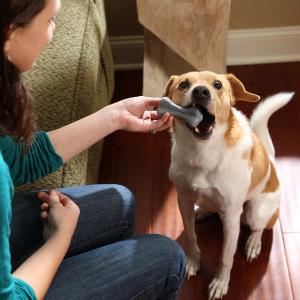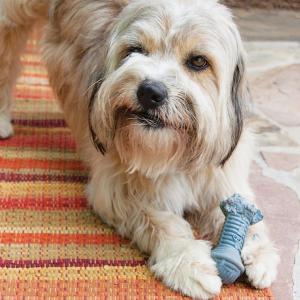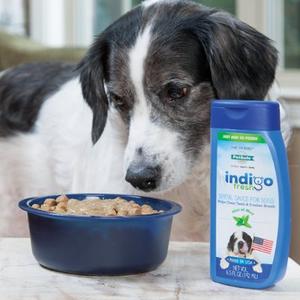Sadie, a Petsafe “employee” is all smiles!
February is National Pet Dental Month, and what an important month that is! You might have seen lots of articles about how to brush your dog’s teeth and veterinarians running specials on dental cleanings. The reason why all of this happens is because, unfortunately, doggy teeth rarely get enough attention from their owners.
Owners are left with the myths that dogs clean their own teeth with their kibble, or that dog teeth don’t need to be cleaned at all. But beliefs like that often lead to neglected teeth, major tartar build-up, and potentially life-threatening infection. There are hundreds of articles out there this month that emphasize the importance of taking care of your dog’s teeth. To avoid repeating, I’ll focus on a few things that those articles might not have covered. These factors can play a tremendous role in cleaning your dog’s teeth.
Doggy dental toys- are a terrific addition to your “Doggy Dental toolkit!" There are several different types of dental toys. The two most popular are rubber toys and nylon toys. Rubber toys usually have little rubber ridges or nobs to scrape against the teeth and massage the gums. Nylon toys are a much harder material and as the dog chews, the toy scrapes the teeth. Both of these types of toys may come with a dental treat or some sort of toothpaste that encourage the dog to play and chew on the toy. Both of these toys have advantages and disadvantages, which means there is one very important rule of thumb—SUPERVISION!
While nylon toys do a great job scraping the teeth, they are also very hard and can potentially break teeth if a dog chews too hard. Unfortunately, many broken teeth need to be removed due to the risk of infection. That surgery can be very expensive! To avoid this problem, supervise your dog with nylon toys. If they seem to get a really good grip on a toy and chew very hard, take away the toy for a little while. Also, you might want to consider finding nylon toys that a dog cannot fit in the back of his mouth as easily so he can’t bite down as hard. 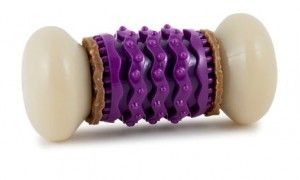
The Busy Buddy Nobbly Nubbly is a great option because the ends are much thicker/wider and dogs have a harder time getting them in their back molars.
Rubber toys also pose risks. Because rubber is not as durable as nylon, it is possible for rubber to be chewed up. Chewed up pieces can be ingested and may not pass through a dog’s digestive system. This can also lead to very expensive surgery. When your dog is chewing on a rubber toy, it’s important to supervise so that you can remove any damaged or chewed up pieces.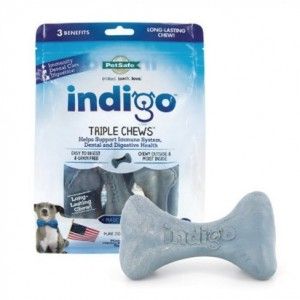
The indigo Triple Chew treats are a great long-lasting dental option for dogs!
Dental treats- are also great additions to a “Doggy Dental Toolkit”. There are several treats on the market that are good for dog teeth, such as bully sticks or pig ears. Several of them require the dog to chew them for a while, which scrapes the tartar off of the teeth. However, this lengthy chew time might mean that you need to pick up the treat from your dog to give him a break or so he can finish it later.
For some dogs, this might not go over very well. Dental treats can be some of the tastiest treats or food your dog will get. When you try to take it away, the dog might get frustrated or even aggressive. Of course they don’t want you to take away their treat! Consider your dog’s perspective—what if you had the perfect, tastiest, most wonderful cupcake—and then someone snatched it away before you could finish? You’d be upset too!
This is when safety should be your number one concern. If you don’t have a reliable “Drop it” on cue, you’ll need a safe way to take the treat away from your dog. You should always offer a “trade” for the dental treat. You don’t want the dog to make the association that when people come around, their favorite things get removed and they’re left with nothing. Instead, you want to make the association that when people come around, they might offer something absolutely wonderful.
When you are ready to take the dental treat away from your dog, offer the dog a few really tasty treats, such as pieces of cheese or hot dog. When the dog drops the dental treat and is focused on getting the other tasty treats, take the dental treat away. Put the dental treat away and reward your dog again with a few more tasty treats for a job well done. If your dog growls at you for trying to remove the dental treat, do not take it away. Your dog is growling as a warning- he is asking you to leave his treat alone. If you take his treat anyway, he could learn that you disregard his warnings and you can’t be trusted. This could mean that he won’t give you a warning next time- perhaps he’ll escalate right to a bite.
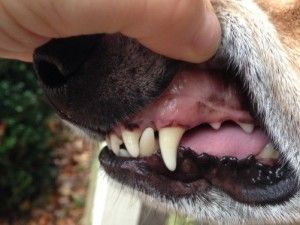 Instead, find something that is equally rewarding and do the “trade” with your dog. Having a stress-free interaction as you take away his dental treat will teach your dog that he can trust you. Don’t ever yell or try to “dominate” your dog over a dental treat. This is a sure-fire way to escalate your dog’s stress, ensuring that he definitely won’t trust you next time he has a dental treat. Keep the situation calm, relaxed, and quiet. You want it to be “no big deal” that you took the dental treat.
Instead, find something that is equally rewarding and do the “trade” with your dog. Having a stress-free interaction as you take away his dental treat will teach your dog that he can trust you. Don’t ever yell or try to “dominate” your dog over a dental treat. This is a sure-fire way to escalate your dog’s stress, ensuring that he definitely won’t trust you next time he has a dental treat. Keep the situation calm, relaxed, and quiet. You want it to be “no big deal” that you took the dental treat.
Brushing your dog’s teeth- is one of the best things you can do to ensure doggy dental health. However, this can be stressful for both you and your dog if you aren’t used to it. Dogs aren’t used to having a toothbrush or a finger brush rubbing around in their mouth, and most likely, all they really want is for you to leave them alone so they can lick the toothpaste.
There are several different types of toothbrushes, finger brushes and toothpastes on the market. Regardless of which types you use, you’ll want to slowly acclimate your dog to getting his teeth brushed. First, introduce your dog to the toothbrush or finger brush by putting something tasty on the brush and letting your dog lick it off. When your dog seems comfortable, you can begin brushing his teeth. Don’t do your entire dog’s mouth in one session—as your dog is getting acclimated to the brushing, do only a few teeth at a time and then give your dog a break. The more often you work with your dog, the quicker he’ll get comfortable with getting his teeth brushed.
Many veterinarians recommend brushing your dog’s teeth a few times per week, but you can actually brush them every day if you’d like. With practice, you’ll soon be able to brush your dog’s entire mouth in one sitting. As your dog is getting used to having his teeth brushed, pay very careful attention to his body language. Does he seem stressed out? If so, stop and slow down the process. Brushing a dog’s teeth requires a person to be pretty close to a dog’s face and obviously very involved in the mouth. If your dog seems stressed, this can quickly escalate to growling or even a bite. Taking the training process as slowly as your dog requires is important to having a successful future with getting his teeth brushed.
 Some puppies are extremely excitable and will think that brushing their teeth is a fun game. Make sure to keep them calm so you can avoid unnecessary playful puppy bites to your fingers. If you’re starting your puppy off right, you might begin by brushing their teeth during their socialization period. (Even though puppies will lose their baby teeth, it’s a great idea to brush them anyway- it gets them used to you doing it, so when their adult teeth come in, it won’t be an issue!) This is great! However, some puppies might get overly excited by you brushing their teeth—they love your hands in/near their mouths!
Some puppies are extremely excitable and will think that brushing their teeth is a fun game. Make sure to keep them calm so you can avoid unnecessary playful puppy bites to your fingers. If you’re starting your puppy off right, you might begin by brushing their teeth during their socialization period. (Even though puppies will lose their baby teeth, it’s a great idea to brush them anyway- it gets them used to you doing it, so when their adult teeth come in, it won’t be an issue!) This is great! However, some puppies might get overly excited by you brushing their teeth—they love your hands in/near their mouths!
Consider brushing their teeth during a calm period, such as when they’re sleepy or after a long walk. If they start to chew on your fingers or brush playfully, stop brushing their teeth and walk away. When they do a great job, give them verbal praise and/or a tasty treat to let them know they got it right! Don’t yell or punish your puppy—it will just confuse them. They assume that you put the brush or hands there for them to play with, and we can’t blame them for thinking that! The best thing we can do is reward them for a good job and ignore the bad behavior.
Doggy dental health is extremely important. If a dog’s teeth are neglected, it can cost hundreds of dollars to fix them. Bad breath, dental cleanings and surgery to remove broken or rotten teeth can be avoided if an owner takes proper care of their dog’s teeth. Just as important, rotten teeth and tartar build-up can lead to a lot of health related problems, so taking care of your dog’s teeth is important for a dog’s health and well-being.
Having an expansive “Doggy Dental Toolkit” equipped with dental toys, treats and brushing supplies can be the first step in maintaining great dental health. You’ll also want to make sure that you discuss your dog’s teeth at every vet visit. This might include conversations about how to prevent problems and how to deal with any potential problems that might already exist, such as tartar build-up or broken teeth. Happy smiling!

